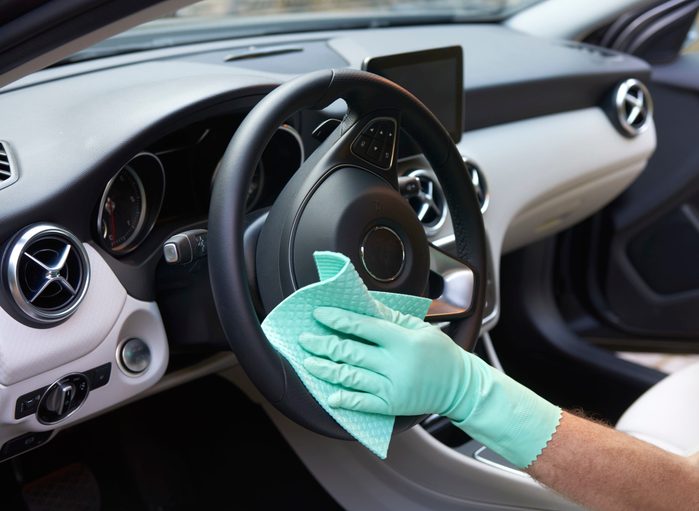
Deets for deets
If you use your car a lot (and are often transporting food, kids, and/or pets) your car probably gets pretty filthy, pretty quickly. Getting a professional car detail can restore your ride to its original, new car state and maybe even infuse it with that intoxicating new car smell, but detailing services are pricey. Thankfully, you can do many of the car detailing services yourself—and save a ton of money.
If you like your vehicle nice and tidy, and free of Goldfish crumbles, pet hair, and melted crayons, and also like to save money, you can perform a DIY car detail, easily and affordably with car detail secrets.
Note: Prices listed were accurate as of press time; pricing fluctuations may occur.
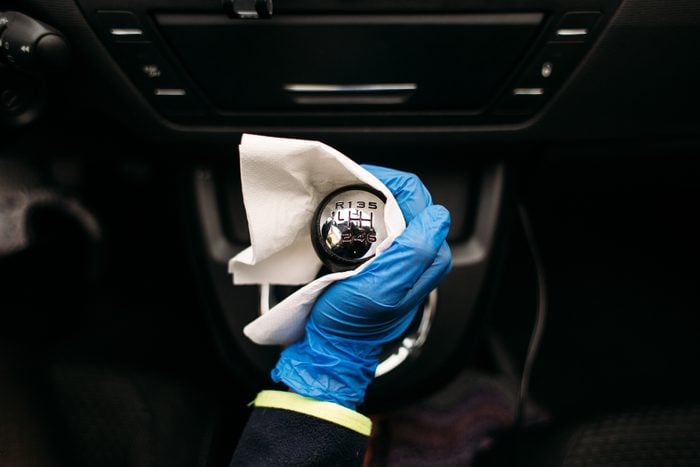
Detail every day
$4.49
Professional car detailers know that the best way to save money on detailing is to not let your car get so dirty that it screams out for expensive, professional help. It might seem like a secret but you can keep your interior tidy and smelling great with ease and without much cost.
To restore the new car smell and keep your car’s interior surfaces clean and protected, pick up a tube of Meguiar’s New Car Scent Protectant Wipes to keep in your trunk. Then, every week or so, take one and give your car a once-over.
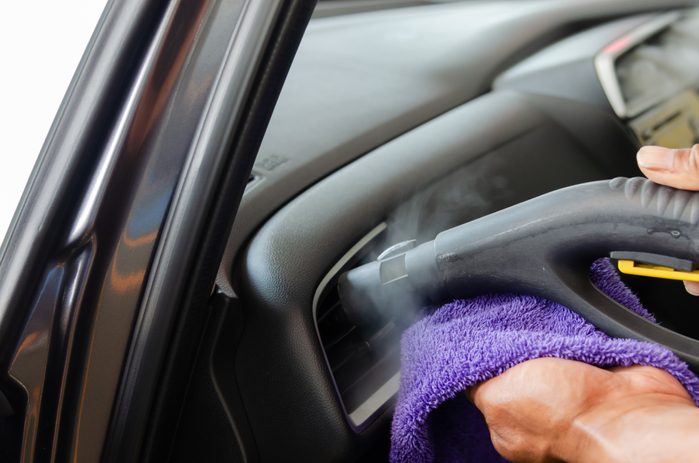
Steam clean it yourself
$39.97
If you have carpeted floor mats and cloth seats, use a handheld steam cleaner to deliver that secret professional car detailing level of service for yourself. You don’t need to pay a pro to restore your fabrics, but you will need to make a small initial investment and, most importantly, you will need to wait until the rest of your ride is detailed—because you should always finish with the carpets and seats.
The chemical-free handheld cleaning system from PurSteam comes with a nine-piece accessory set and is capable of restoring a multitude of surfaces back to their pristine, original state. Here’s how to really clean the interior of your car.
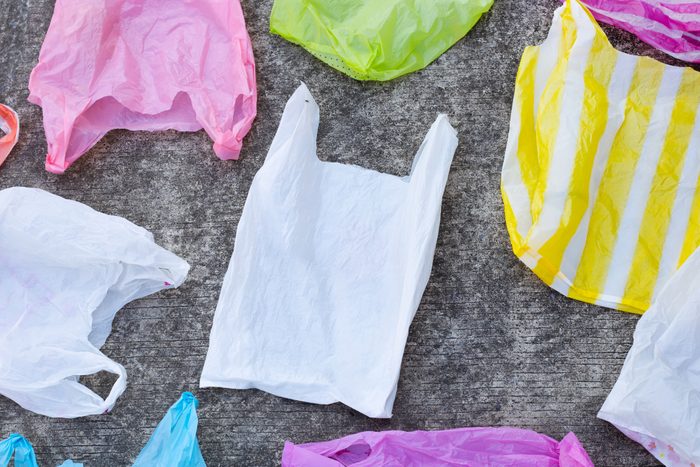
Use a plastic bag
$17.97
You need to check the paint to ensure all the dirt and abrasions have been removed before applying a coat of wax but how is it possible to do this without leaving a trail of fingerprints on your freshly washed car? Holts Auto says to use a plastic bag. Yep, a standard plastic grocery bag can help. Just put your hand in it and run it over the surface of the car. You’ll be able to feel if there are any leftover bumps and bits of dirt, without getting fingerprints on the exterior. Now you can move forward with the wax to make your car shine. Give the Chemical Guys Butter Wet Wax a spin to see professional results. Extend the life of your vehicle with these car maintenance tips from the pros.
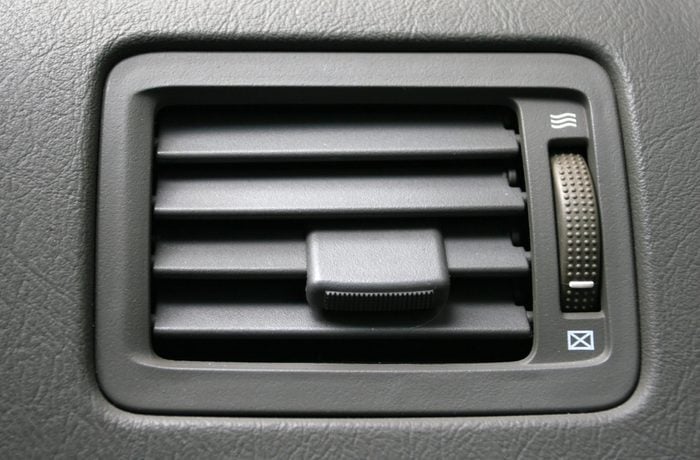
Blow out the vents
$7.79
One of the car detailer’s details that make your car feel and smell better is the cleaning out of air vents. To do this easily for your DIY car detailing project and get professional-grade results: use a can of compressed air. A lot of nasty particles of dust and dirt, along with moisture too, accumulates inside air vents. This can cause odor to come blowing into your car when the vents are open and on.
A can of Falcon Dust compressed air will remove much of this and instantly give your car a fresher smell when the a/c and heat are running.
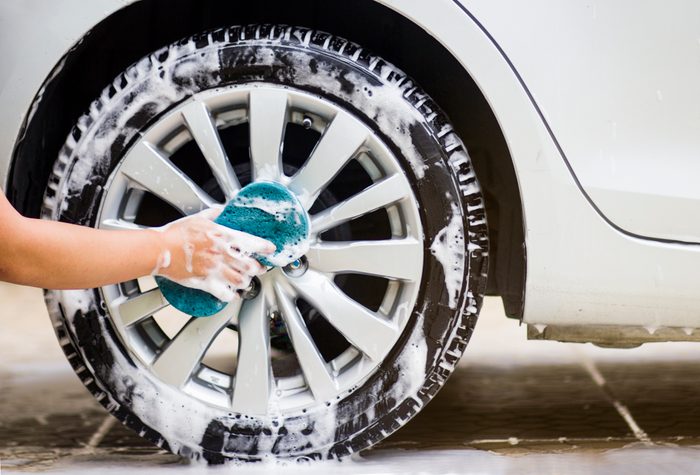
Don’t forget your tires!
$9.99
Along with the brakes, your four tires are the most important part of your car. They are also the closest to the road, so the dust, the dirt, and the wear really shows. When detailing your car yourself, make sure you focus on the tires to bring a full glisten to your vehicle. You’ll need a dedicated tire cleaner and a good brush for this specific job.
A power washer will help get your tires shiny, but to obtain a professional-grade detailed clean, pick up an affordable ergonomically designed wheel & tire brush with a bonus scratch-free detailing brush containing no metal parts or long bristles. If you don’t have the time or desire to get down on the ground to scrub your tires, buy a bottle of Black Magic No Scrub Wheel Cleaner, spray it on and watch the grim dissolve away like…magic. Have you ever wondered which tires car experts buy for themselves and their own cars?
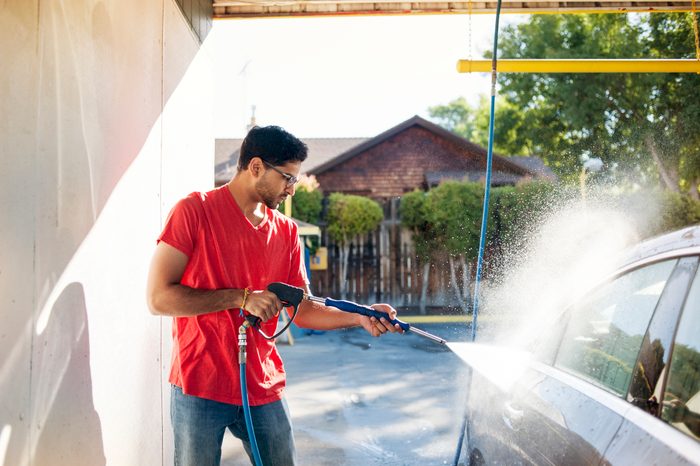
Rinse before washing
$139.00
If you hit your car with soapy water before a preliminary clean water rinse, you’ll be grinding surface dust and road grit into your paint finish. That’s a big no-no. Professional detailers always start with a rinse of clean water to remove as much dust and dirt as possible before getting started with the cleaning. For the pre-wash rinse as well as post-soap big finish, the Sun Joe pressure washer is the ideal tool to detail the exterior of your car.
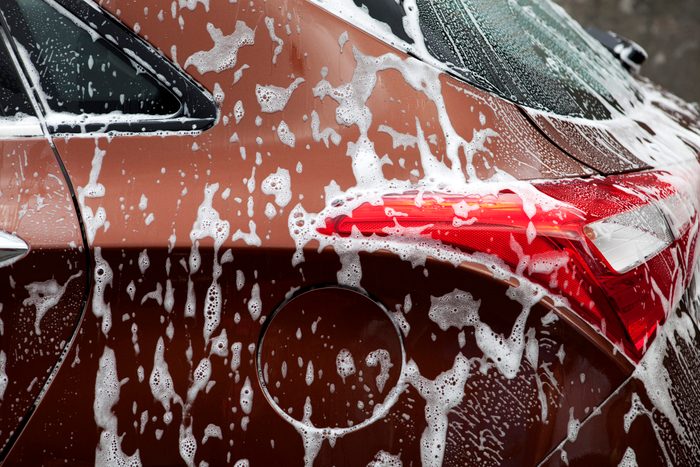
Use the right soap
$11.49
Dishwashing liquid is the go-to choice for most DIYers. But it shouldn’t be. Dishwashing detergent is simply too harsh. It sucks important oils out of your car’s finish and can actually shorten the life of your paint. Any industry car washer would tell you that!
The ultra-sudsy Mothers California Gold Carnauba Wash is a powerful, biodegradable soap capable of helping you remove all the grime from your car without leaving any spot behind. Your ride will shine and its wax will be boosted, all for a DIY-friendly price.
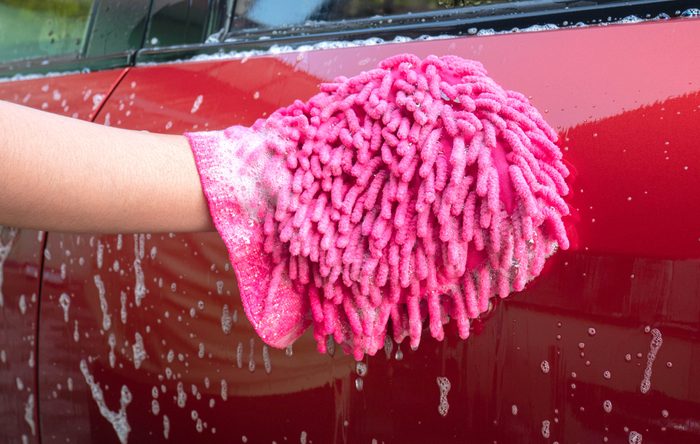
Forget the sponge, use a microfiber mitt
$3.99
Sponges capture and hold dirt and grit in their large pores. You can wring them out, but the grit will stay put. And once grit is embedded in your sponge, you may as well wash your car with sandpaper! Detailers use a microfiber car wash mitt instead because the grit falls out when you rinse. If you haven’t been cleaning with microfiber cloths, you should be.
Ditch your sponges in favor of the affordable MCIGICM Car Wash Mitt Sponge Glove. This large scratch-free, soft microfiber mitt will keep your car clean without scratching it during your DIY car detail. And because it’s machine washable, it’ll be ready to serve you well again and again.
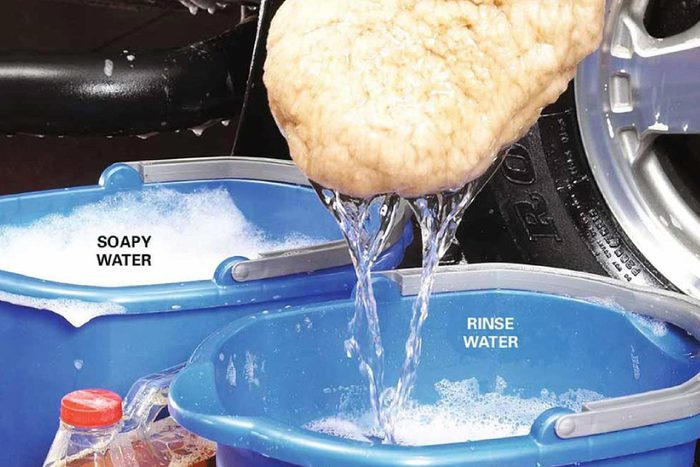
Use two buckets
$12.99
One for clean soapy water and one for rinse water. After each wipe, dunk your dirty wash mitt in the rinse water bucket and swirl it around to dislodge the dirt and grit. Then dunk it in the soapy water and pick up where you left off. Dump the dirty rinse water and refill with clean water before you move to the other side of the car. That’ll keep the soapy water clean.
Pick up a couple of these 3.5-gallon Meguiar’s buckets to manage your soapy water and your crystal clear rinsing water for your next driveway car detail. By the way, here’s why you should never go to another car wash.
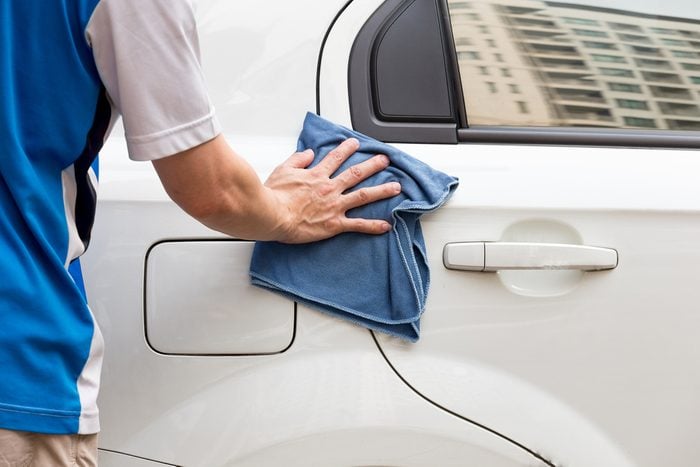
Forget the chamois, dry with a microfiber towel
$11.99
Chamois soak up water, but they don’t pick up any grit that’s left after rinsing. Instead, they just grind those particles into your paint. A microfiber towel, on the other hand, collects the particles. Rinse the cloths in clean water to remove the grit. Then wring and keep drying. Microfiber cloths are not only an awesome cleaning product, but they’re also reusable (just don’t toss them in the dryer).
Buy a 24-pack of Amazon Basics microfiber cloths for your DIY detailing work. These soft, non-abrasive microfiber cloths won’t scratch-up your exterior paint or other vehicle surfaces, absorb eight times its weight, and give you a streak-free finish.
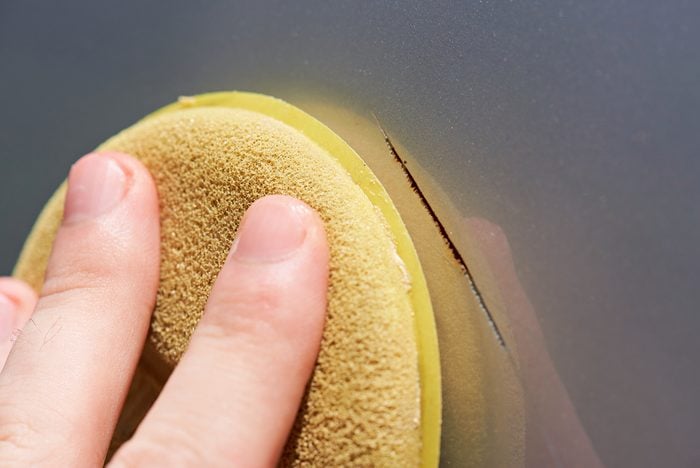
Remove minor scratches before polishing
$19.95
This crucial step is what separates the car detail DIY-ers from professional detailers. Polishing increases the shine, but it doesn’t remove scratches. However, if you remove the scratches first with a scratch removal kit and then polish, you’ll get an even more brilliant shine.
For light scratches, swirls, or other marks, the easy fix is using Carfidant’s Scratch and Swirl Remover. The affordable DIY-priced kit includes a buffer pad and a specially formulated compound that will allow you to erase years of wear and tear from your car’s exterior, and bring a beautiful shine back to your ride.
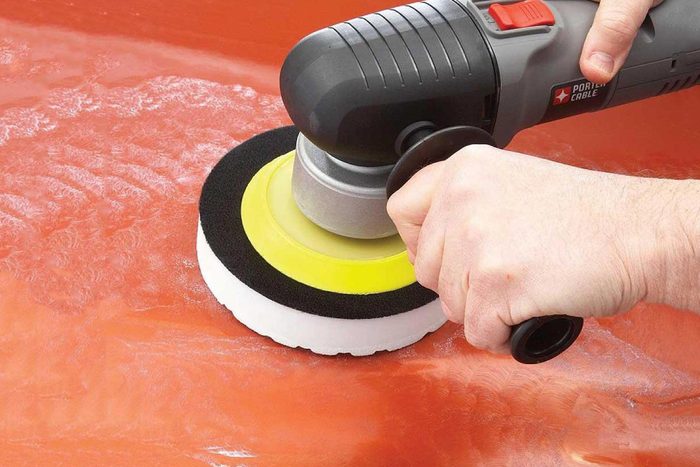
Buy a dual-action polisher
$69.97
Detailers wouldn’t be caught dead without a dual-action polisher, but don’t confuse this incredible tool with a high-speed buffer. Buffers run at much higher speeds and can burn the paint right off your car if you stay in one place too long or press too hard. Polishers are different. They run at lower speeds and oscillate as they rotate. Any DIYer can get the hang of polishing in just a few minutes. Polishing before waxing makes a huge difference, so your investment really pays off.
One more polishing tip from professional detailers—apply the polish to the machine’s pad. Then wipe the pad across your paint. That’ll prevent all the polish from flinging off the pad as soon as you hit the trigger.
ZOTA Buffer Polisher is a multi-speed polisher with a soft start, making it smoother and safer to use. The high-speed setting will remove paint defects and oxidation, medium speed is for polishing and cleaning, while the lowest setting is going to be your choice for waxing and buffing. This one polisher tool will serve you well as you do your detailing yourself from now on.
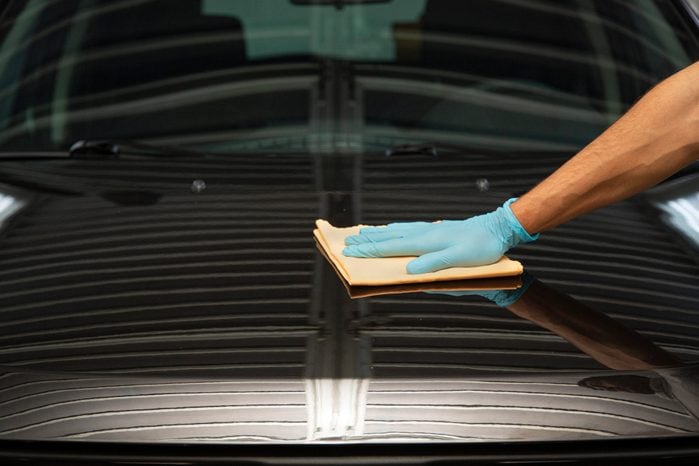
Use synthetic wax
$14.48
Old style paste waxes look great on antique cars. But they don’t produce the same “wet look” as modern synthetic wax, and they don’t last as long. When car dealers sell paint sealant, they’re really just applying a high-quality synthetic wax, which is something you can do yourself for a fraction of the price. Apply synthetic wax, such as Mother’s California Gold Synthetic Wax Liquid, in small sections using a wax applicator sponge.
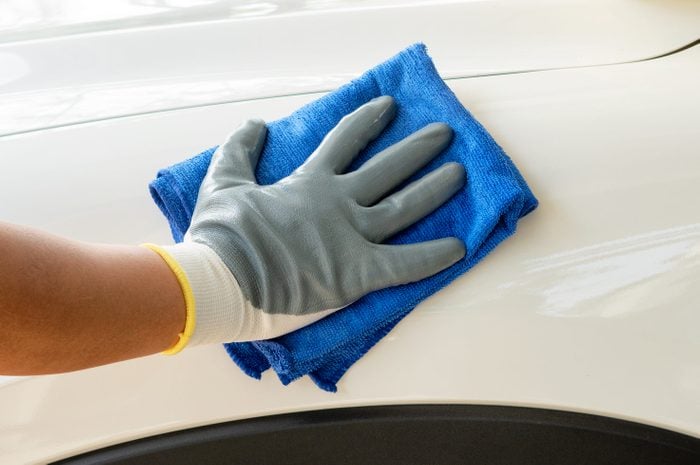
Remove wax haze with a microfiber towel
$7.49
You guessed it, microfiber towels are the heroes of car detailers everywhere. Wipe off the wax haze using circular motions. As the towel loads with wax, refold it to a cleaner section. Use a second towel when the first one is fully loaded.
Have a separate set of microfiber towels for wiping away the wax from your car. This three-pack of Chemical Guys 16-inch square Workhorse Professional Grade Microfiber Towels are lint-free and machine washable, and are a durable choice for scratch-free DIY car detail performance.
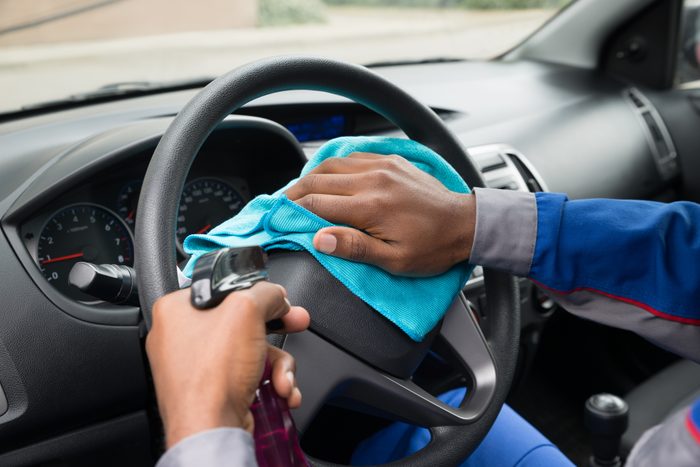
Start at the top
$29.99
Do it yourself car detailers usually start by vacuuming the carpet, because that tends to be the dirtiest and most rewarding part of the car’s interior straightaway. But then you’ll just push dirt from the dash, seats, and door panels back onto your freshly cleaned carpet. Professional detailers start at the top and work their way down to the carpet, and you should do the same!
Sometimes cleaning carpets isn’t enough. Is it time for you to replace your floor mats with something new, weatherproof, and easier to clean? Check out these affordable Armor All rubber floor mats.
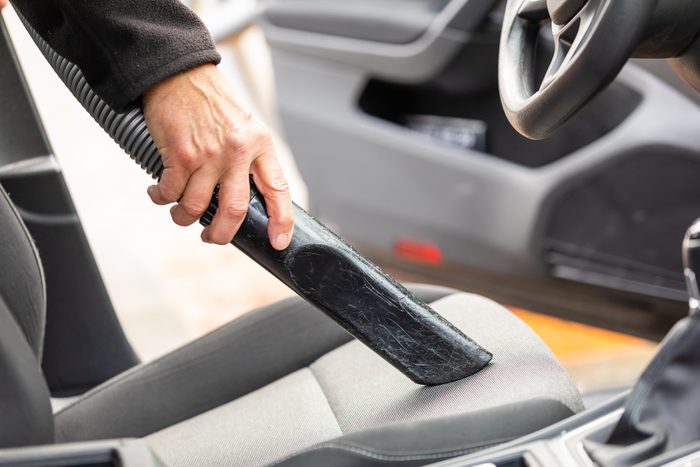
Suck it up as you go
$26.35
Use a small detailer’s brush and shop vacuum to remove dust and dirt from all the nooks and crannies on your dash and console. Hold the shop vacuum wand near your brush to suck up all the crud as you work your way down to the floor.
For every single nook and cranny inside your car, there’s a nozzle attachment in this WORKSHOP wet/dry vacuum set to do the job perfectly for you. Learn how often you should really be cleaning the inside of your car.
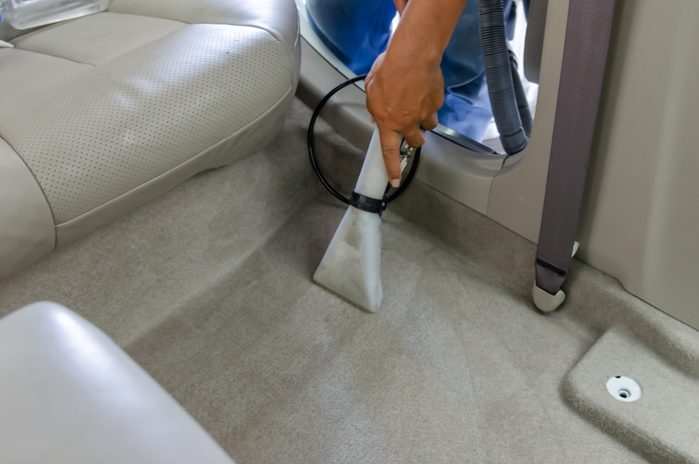
Brush and vacuum your carpet
$34.99
Automotive carpet doesn’t like to let go of dirt. If you simply try to vacuum it all up, you’ll leave plenty behind. To remove more dirt, detailers use a stiff brush and scrub the carpet as they vacuum. You’ll see the dirt particles bounce to the surface so you can suck them up with your vacuum.
Having a small car vacuum, like this one from ThisWorx, handy not only helps your DIY your car detail to smoothly, it’ll also help keep your car clean on a regular basis, which will make your detail quicker and easier to do.
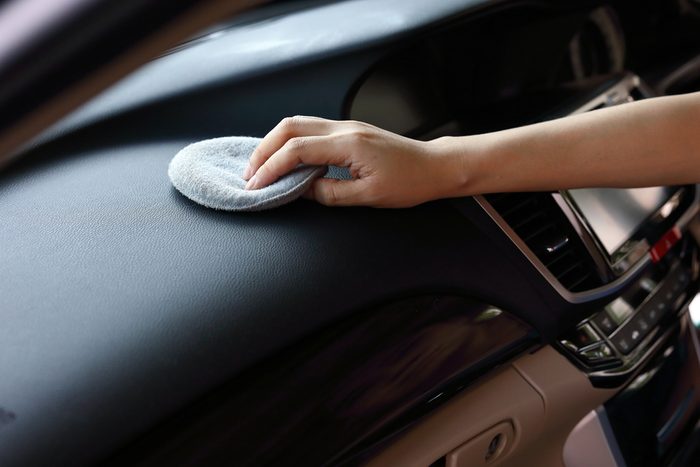
Use a non-silicone matte finish dash and vinyl protectant
Silicone dashboard protectant sprays leave a slick film on your dash that actually attracts more dust, so you’ll have to clean it more often. Plus, a shiny dash reflects into your windshield. That reflection and glare can reduce your vision, especially at night. That’s why professional detailers use non-silicone matte finish protectants. They still look great and they reduce glare.
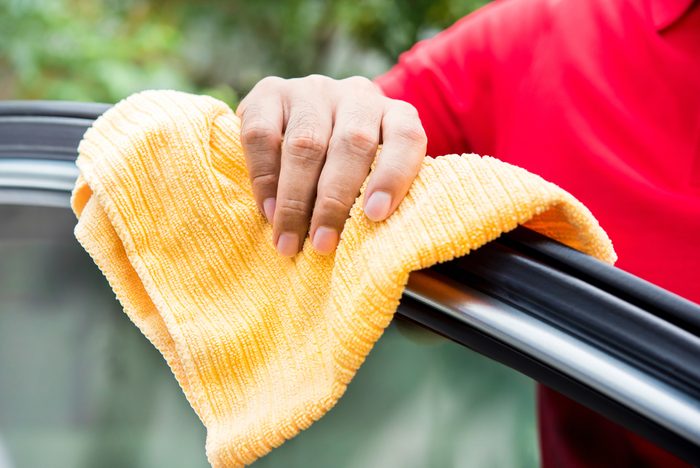
Lubricate door seals
$11.04
Silicone dashboard protectant sprays leave a slick film on your dash that actually attracts more dust, so you’ll have to clean it more often. Plus, a shiny dash reflects into your windshield and that could make driving more dangerous because that reflection and glare can reduce your vision, especially at night. This is why professional detailers use non-silicone matte finish protectants. They still look great and they reduce glare. Adam’s Matte Detailer is an easy to use matte finisher that leaves no streaks or residue, only a wonderful scent, and clean matte finish with zero shine on your interior surfaces.
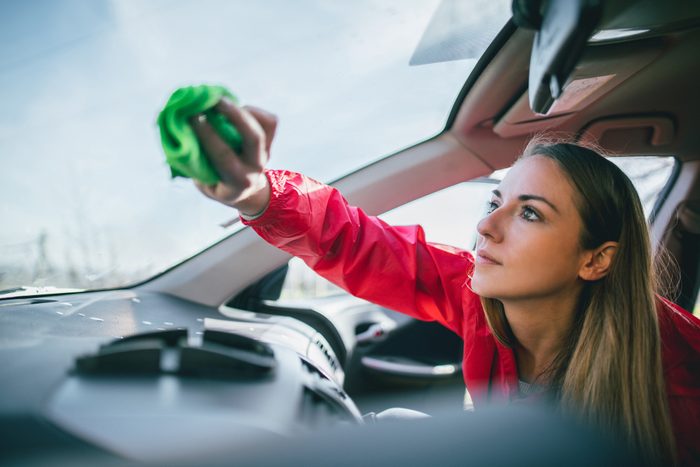
Finish with the glass
$17.00
If you cleaned the inside of your windows before you cleaned the dash and applied vinyl protectant, you’ll just have to clean them again. That’s why detailers save glass cleaning until the very end. Cleaning the windows at this point removes all cleaning and vinyl treatment overspray and leaves you with sparkling clean windows.
To get a professionally cleaned window, skip the grocery store window and mirror cleaner in favor of Invisible Glass Premium Glass Cleaner and Window Spray. This cleaner is safe for tinted windows too, and will leave your glass streakless, residue-free, and impossibly clean. Next, check out these maintenance tips that will extend the life of your car.
